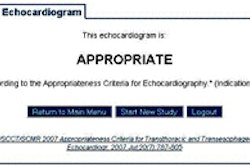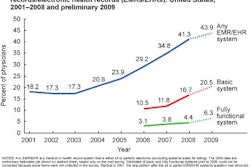Chief information officers of U.S. hospitals are cautiously optimistic about their chances to qualify for federal stimulus payments for "meaningful use" adoption of electronic health records (EHRs), according to a new survey from the College of Healthcare Information Management Executives (CHIME).
Twenty-eight percent of survey respondents reported that they expect to qualify to receive stimulus funds authorized by the American Recovery and Reinvestment Act (ARRA) in the first six months of fiscal year 2011, which starts on October 1, 2010. An additional 62% reported that they expect to qualify between April 2011 and October 2012. Only 10% did not expect to qualify until fiscal years 2013 or 2014.
Chief information officers (CIOs) who reported that their hospitals expect to qualify within the first six months tended to represent larger healthcare organizations and academic medical centers. Nearly all respondents of facilities with 600 to 999 beds expect to qualify within the first two years, whereas only 66% of respondents at 100 to 199 bed hospitals expect to do so.
The question is whether the opinion of survey respondents are representative of the 1,400 CHIME members, who are CIOs of community hospitals, large hospital systems, for-profit hospitals, and small and rural hospitals in the U.S. Only 11% responded to this first survey, which the Ann Arbor, MI-based organization plans to conduct on a quarterly basis to identify trends among healthcare providers in achieving meaningful use and qualifying for stimulus funding.
In August 2010, CHIME sent a survey to its CIO members requesting that they assess their hospital's expectations in qualifying for stimulus funding by achieving meaningful use criteria for EHR adoption during fiscal years 2011 or 2012. The U.S. Centers for Medicare and Medicaid Services (CMS) had published its final meaningful use rules that relaxed the requirements several weeks earlier, and the CHIME survey was designed to assess whether these modifications would make a difference.
The more flexible rules will have little to no effect in terms of improving providers' ability to achieve them, according to 75% of the respondents. Approximately 40% stated that they were well positioned to achieve meaningful use with their current IT strategy and existing applications. However, more than half reported that they were either accelerating their plans to implement EHR or otherwise re-evaluating current HIT applications to obtain funding.
Greatest concerns
Certification issues dominated the top three concerns of survey respondents. Concerns included implementing or upgrading to a certified EHR and the need to certify self-developed applications.
The respondents also expect delays because of the newness of the certification process. In fact, the U.S. Office of the National Coordinator for Health Information Technology (ONC) first published approved test procedures for certification criteria during the time the survey was being conducted from August 3-18, 2010. (These test procedures can be accessed here.)
CHIME members who are versed in the intricacies of the evolving federal program to incentivize the installation of EHRs caution that much remains unknown about how the federal program will operate.
The ONC did not name the first two authorized testing and certification bodies, the Certification Commission for Health Information Technology (CCHIT) of Chicago and the Drummond Group of Austin, TX, until late August. To date, published details about the product certification process are sparse.
CCHIT will launch its program on September 20, 2010, according to company spokesperson Sue Reber, and CCHIT will make more details available at that time. As of September 14, specific details about ONC certification of EHR systems and modules still had not been posted on the Drummond Group's website.
"CIOs are still early in the discovery process. We don't yet have a complete understanding of the certification process and its impact on providers," said Pamela McNutt, senior vice president and CIO of Methodist Health System, Dallas, and chair of CHIME's policy steering committee. "The reality of what it will take to qualify for stimulus funding won't be fully known until our vendors have obtained certification," she added.
After certification issues, the next most frequently cited concern in the CHIME survey was computerized physician order-entry (CPOE) systems. Many hospital organizations reported that they had little or no leverage in encouraging physicians to use CPOE systems. In addition, the systems require a lot of work to implement and depend on other clinical systems being in place to function at a high level, according to the survey report.
The survey report may be read by clicking here.
By Cynthia E. Keen
AuntMinnie.com staff writer
September 20, 2010
Related Reading
ONC announces certification firms, August 31, 2010
Report: 2% of hospitals meet 'meaningful use' criteria, August 30, 2010
Meaningful use: Comply and get paid ... but how? August 23, 2010
Report: U.S. hospitals lag in CPOE adoption, June 22, 2010
Hospitals need to scramble on stimulus fund goals, March 3, 2010
Copyright © 2010 AuntMinnie.com



















